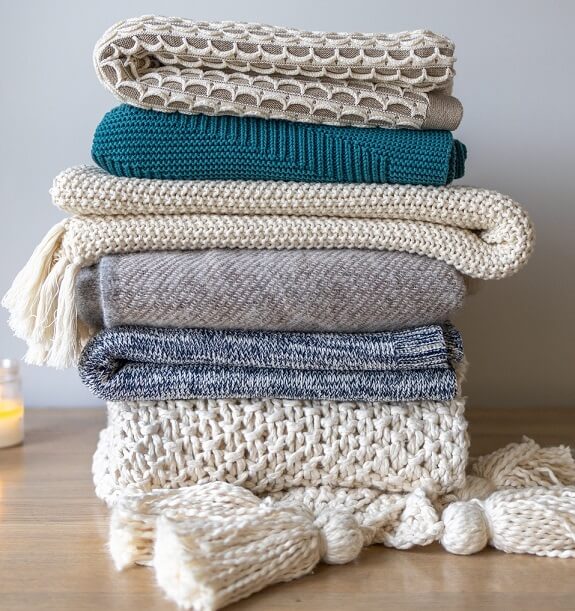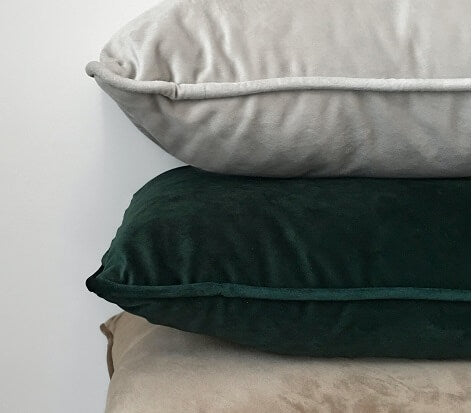Have you heard of weighted blankets? These heavy blankets have been gaining popularity in recent years, with claims that they can help improve sleep, reduce anxiety, and even relieve pain. But what does a weighted blanket actually do, and are these claims backed by scientific evidence? In this blog post, we'll take a closer look at the truth about weighted blankets and what they can and cannot do for you.
What Are Weighted Blankets?
Weighted blankets have gained significant attention in recent years for their potential benefits in improving sleep, reducing anxiety, and relieving pain. But what exactly are weighted blankets?
At their core, weighted blankets are simply blankets filled with materials such as glass beads or plastic pellets to add weight. The added weight ranges from around 10 to 30 pounds, depending on the individual's preference and body weight. The weight distribution across the body is believed to create a calming and soothing effect, similar to the feeling of a comforting hug or a gentle massage.
The concept of using weighted blankets is rooted in deep touch pressure stimulation, which is known to trigger the release of serotonin, a neurotransmitter that helps regulate mood and promote relaxation. The pressure provided by the blanket is thought to activate the body's natural relaxation response, leading to a reduction in anxiety and an overall improvement in sleep quality.
It is important to note that weighted blankets are not a one-size-fits-all solution. Different individuals may have varying preferences when it comes to the weight and material of the blanket. It is crucial to choose a weighted blanket that is appropriate for your body weight to ensure maximum effectiveness and safety.
In the next sections, we will delve deeper into the science behind weighted blankets, explore the potential benefits they offer, and discuss situations where they might not be the best option. Stay tuned!

The Science Behind Weighted Blankets
Weighted blankets may seem like a simple concept, but there is actually science behind their effectiveness. The key lies in deep touch pressure stimulation, which is the pressure exerted by the weighted blanket on the body. This stimulation triggers the release of serotonin, a neurotransmitter that plays a crucial role in regulating mood and promoting relaxation.
When the body experiences deep touch pressure, it activates the parasympathetic nervous system, also known as the "rest and digest" response. This response helps reduce the activity of the sympathetic nervous system, which is responsible for the "fight or flight" response. As a result, heart rate and blood pressure decrease, muscle tension is reduced, and the body enters a more relaxed state.
This calming effect can have a profound impact on sleep and anxiety. The weight distribution across the body mimics the feeling of a comforting hug or a gentle massage, which can help ease anxiety and promote a sense of security and relaxation. This can lead to improved sleep quality and a decrease in symptoms of anxiety.
However, it's important to note that the science behind weighted blankets is still evolving, and more research is needed to fully understand their mechanisms of action. Nonetheless, the positive anecdotal experiences and growing body of evidence suggest that weighted blankets may be a beneficial tool for sleep and anxiety management.
The Potential Benefits of Using Weighted Blankets
Weighted blankets have gained significant attention in recent years due to their potential benefits. While scientific research is ongoing, many individuals have reported experiencing positive effects from using weighted blankets. Here are some potential benefits:
- Improved Sleep: Many users have found that using a weighted blanket helps them fall asleep faster and stay asleep throughout the night. The deep touch pressure stimulation provided by the blanket can promote relaxation and reduce tossing and turning, resulting in a more restful sleep.
- Reduced Anxiety: Weighted blankets are often used as a natural, non-medication option to alleviate symptoms of anxiety. The pressure applied by the blanket may help calm the nervous system and decrease feelings of unease or tension.
- Relieved Stress: The gentle pressure from a weighted blanket can create a soothing sensation, similar to the feeling of a comforting hug. This can help reduce stress levels and promote a sense of calmness.
- Alleviated Restlessness: Restless legs syndrome (RLS) and other similar conditions can disrupt sleep and cause discomfort. Some individuals with RLS have reported finding relief when using a weighted blanket, as the added weight can help calm leg movements and reduce restlessness.
- Improved Focus: Weighted blankets have also been used to aid in improving focus and attention, particularly in individuals with ADHD or sensory processing disorders. The deep touch pressure stimulation can help regulate sensory input and enhance concentration.
It's important to note that individual experiences may vary, and weighted blankets may not work for everyone. It's always best to consult with a healthcare professional if you have any specific concerns or conditions before trying a weighted blanket.
When a Weighted Blanket Might Not be the Best Option
While weighted blankets have gained popularity for their potential benefits, they may not be the best option for everyone. Here are some situations where a weighted blanket might not be the right choice:
- Children under the age of 3: Weighted blankets are not recommended for infants or toddlers, as they may pose a suffocation hazard. Always consult with a pediatrician before using a weighted blanket for young children.
- Certain medical conditions: Individuals with respiratory problems, such as asthma or sleep apnea, should be cautious when using weighted blankets, as the added weight may restrict breathing. Additionally, individuals with circulatory issues or certain skin conditions may find the pressure from a weighted blanket uncomfortable or even harmful.
- Mobility limitations: If you have limited mobility or struggle to move the blanket on and off your body, a weighted blanket may not be practical. It's important to be able to easily adjust or remove the blanket if necessary.
- Heat sensitivity: Weighted blankets can provide warmth, which may be uncomfortable for those who are sensitive to heat or experience night sweats. Look for breathable and temperature-regulating materials if heat sensitivity is a concern.
Always consult with a healthcare professional if you have any concerns or specific medical conditions before using a weighted blanket.

How to Choose the Right Weighted Blanket for You
Choosing the right weighted blanket for you is essential to ensure maximum effectiveness and safety. Here are some factors to consider when selecting a weighted blanket:
- Weight: The weight of the blanket should be around 10% of your body weight. For example, if you weigh 150 pounds, a 15-pound blanket would be suitable. It's crucial not to go too heavy, as it may cause discomfort or restrict movement.
- Material: Weighted blankets come in various materials, such as cotton, flannel, or minky. Consider your personal preferences and any sensitivities you may have. Look for breathable and hypoallergenic options if you have allergies or if you tend to overheat during sleep.
- Size: Choose a size that covers your entire body comfortably. A blanket that is too small may not provide adequate deep touch pressure stimulation, while one that is too large may be difficult to manage and move around.
- Construction: Look for a well-constructed blanket with evenly distributed weight. This ensures that the pressure is applied uniformly across your body, providing the desired therapeutic effect.
- Washing and maintenance: Check the care instructions for the blanket. Some weighted blankets are machine washable, while others require spot cleaning or dry cleaning. Consider your lifestyle and ability to clean the blanket accordingly.
By considering these factors, you can choose a weighted blanket that meets your individual needs and preferences, enhancing your sleep and relaxation experience. Remember, it's always best to consult with a healthcare professional if you have any specific concerns or conditions before trying a weighted blanket.
The Bottom Line: Are Weighted Blankets Worth It?
Weighted blankets have gained significant attention in recent years, with claims that they can improve sleep, reduce anxiety, and alleviate pain. But are they really worth it? The truth is, it depends on your individual needs and preferences.
Many individuals have reported positive experiences with weighted blankets, finding that they help them fall asleep faster, reduce anxiety, and promote relaxation. The deep touch pressure stimulation provided by the blanket mimics the feeling of a comforting hug or gentle massage, which can have a calming effect on the body and mind. This can lead to improved sleep quality and a decrease in symptoms of anxiety.
However, it's important to note that weighted blankets are not a one-size-fits-all solution. They may not work for everyone, and there are certain situations where they might not be the best option. For example, they are not recommended for infants or individuals with certain medical conditions. It's always best to consult with a healthcare professional before trying a weighted blanket.
In conclusion, if you struggle with sleep, anxiety, or restlessness, a weighted blanket may be worth trying. The positive anecdotal experiences and growing body of evidence suggest that they can be a beneficial tool for sleep and anxiety management. However, it's important to find the right weight, material, and size that suit your needs and preferences. Remember, everyone is different, and what works for one person may not work for another. Ultimately, the decision is yours to make.






